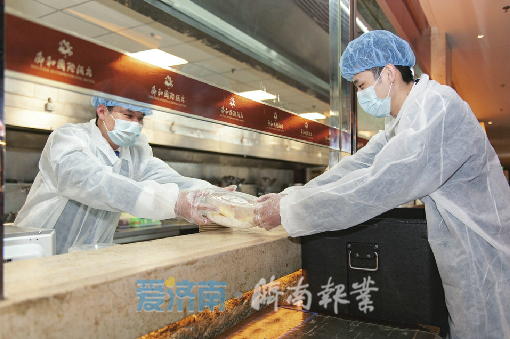How five Jinan catering companies plan to stay afloat amid epidemic
(chinadaily.com.cn)|Updated : 2020-02-19

Staff members pack at Shunhe International Hotel food for takeaway on Feb 16. [Photo by Wang Hanbing]
With the sudden novel coronavirus pneumonia outbreak, China’s catering industry is struggling to survive.
According to the latest data released by the Chinese Cuisine Association, 78 percent of China’s catering companies have lost more than 100 percent of their operating income.
Retail sales in the catering industry declined by around 500 billion yuan ($72.46 billion) during the seven-day Spring Festival holiday.
How can the Jinan catering industry survive the epidemic? What does the future hold?
Reporters from local media interviewed five owners of catering businesses in Jinan to find out how they are handling the crisis.
1. Zhao Xiaoguo, chairman of Shandong Carry Commercial Group
“Business is tough, but we will not lay off employees or cut pay.”
Shandong Carry Commercial Group has more than 350 stores across the country and employs more than 14,000 people. Its stores have been closed since the first day of the Lunar New Year due to the epidemic.
“Carry has monthly fixed expenses of 90 million yuan, with 57 million going toward employee salaries. But I’m still adamant that we don’t lay off employees or cut pay.”
“Many employees requested pay cuts, but I rejected.”
“As the leading catering company in Shandong province, Carry should act socially responsible at a time like this.”
“We have been offering no-contact takeout services since the first day of the Lunar New Year.”
“I think that after the epidemic, the catering industry will develop in a healthier and more quality-oriented way.”
2. Ma Jisheng, chairman of Jinan Landouhua Hotpot Chain
Landouhua Hotpot, founded in 2006, has 45 stores in Shandong province and employs more than 600 people.
“All stores have been closed since the first day of the Lunar New Year. I estimate that we’ve lost 700,000 yuan to 800,000 yuan per day since the start of the Spring Festival holiday.”
“I just applied for a 5-million-yuan loan from the bank, which will help the stores survive another two months.”
“On Feb 10, 30 stores resumed operation offering only takeout services.”
3. Yang Xiaolu, general manager of Yangmingyu Catering Management Co
Yangmingyu has more than 6,000 franchised stores inChinaand 90 in Jinan, all of which are currently closed.
The franchisee stores are being asked not to open until the situation is under control, and make prevention and control efforts as well as adequate preparations for the resumption of business.
After the outbreak, Yangmingyu will offer franchises preferential policies to reduce their losses.
“This is not the first major setback Yangmingyu faced. When the bird flu broke out in 2013, the impact was greater than it is now, but we survived.”
4. Ren Xingben, chairman of Shandong Shunhe International Hotel Group
“I have found many new business opportunities in the face of the current difficulties.”
Shunhe has five hotels with nearly 2,000 employees. All closed on Jan 25 and resumed operation on Feb 7.
During the epidemic, Shunhe Hotel offered take-out services and also developed its own delivery teams.
“We will create customized services for customers and move services from hotels to homes. We’re providing a birthday feast for a man in his own home.”
“We have found that the high-end takeaway market is in great demand, and it will be incorporated into the company’s development strategy in the future.”
5. Zhang Chao, general manager of Jinan Chaoyixing Catering Co
Chaoyixing has 400 stores in Shandong with more than 6,000 employees and more than 200 in Jinan.
“After the outbreak, we allocated a special fund of one million yuan to set up a catering team, providing free meals to staff on the frontlines.”
“At present, 40 stores have resumed operation, all of which are offering no-contact delivery services.”
Chaoyixing cooperated with third party delivery platforms to strengthen online ordering and delivery.
Takeaway business now accounts for more than 30 percent of the company’s revenue, up from around 10 percent.
“Catering enterprises should cope with the epidemic with a positive attitude. The government also rolled out 17 measures to support us.”












